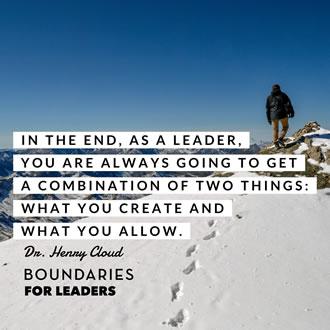I’m reading an interesting book called “Boundaries for Leaders” by Henry Cloud. Boundaries are incredibly important for effective leadership, whether you are leading a small team or a massive organization. But the concept of boundaries can be a little fuzzy. What are boundaries exactly, and how can they help us as we work to get a group of people working in the same direction?
What are Boundaries?
Boundaries have to do with (1) what you create and (2) what you allow. Sometimes it can be helpful to think about a boundary like a property line. At my house, I have a set of property lines that defines what is inside my property and what is outside my property. Whatever is inside my property lines, I am completely in charge of what I create and what I allow. For example, I’m in charge of the landscaping I do. I’m in charge of who gets to come on to my property and who doesn’t.
In Charge
In the same way, when you are a leader of a team or organization, boundaries help determine what you create and what you allow for your team or organization. As a leader, you are in charge of the vision, goals, and strategy. You decide who gets to be on the team and who doesn’t. You are in charge of creating and maintaining the culture of the organization. You decide what happens when a boundary is crossed.
Responsibility
At their core, boundaries have to do with responsibility. It’s easy to blame others for the problems that are happening on your team or in your organization. But as a leader, the buck stops with you. You are ridiculously in charge of what happens under your watch. Boundaries help you to determine what you create and what you allow.
Discussion
How responsible do you feel for what happens on your team and in your organization? Do you tend to blame others for what is happening? Or do you recognize that as a leader you are ridiculously in charge, and the buck stops with you?



Leave A Comment